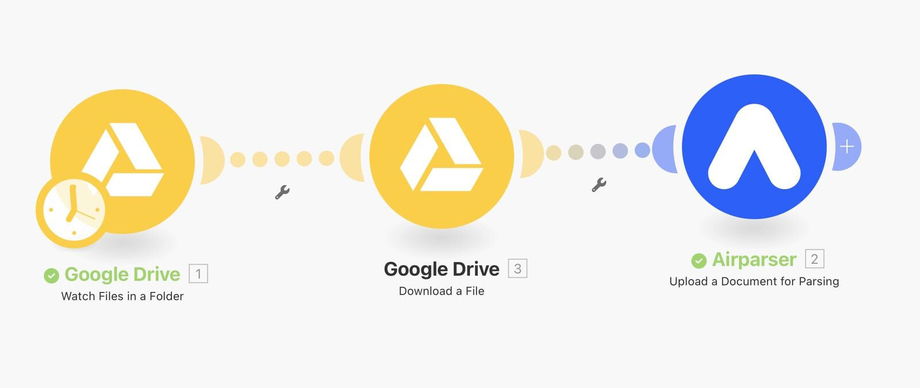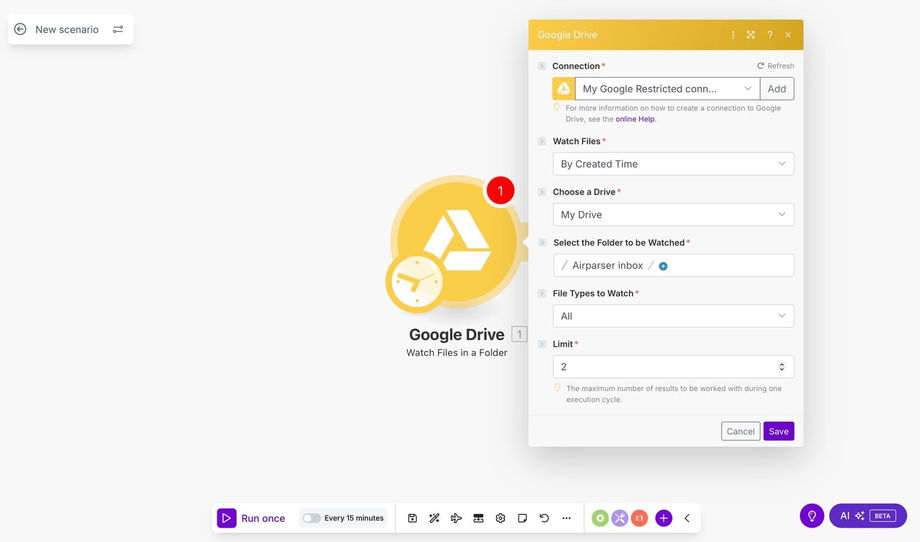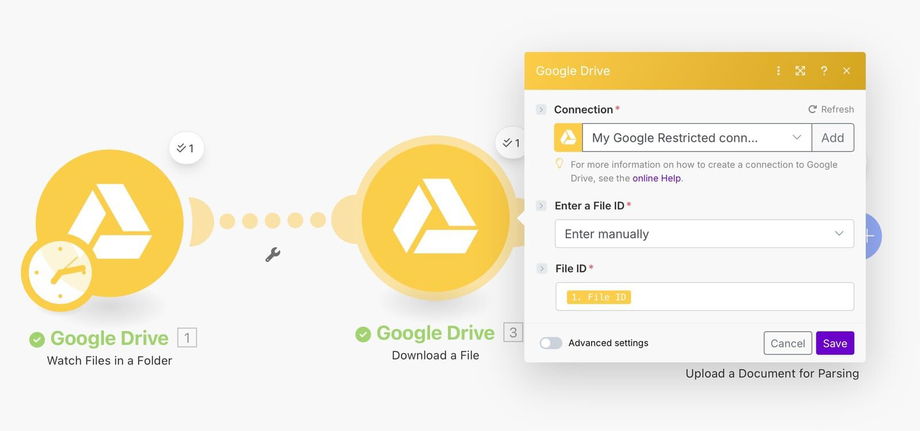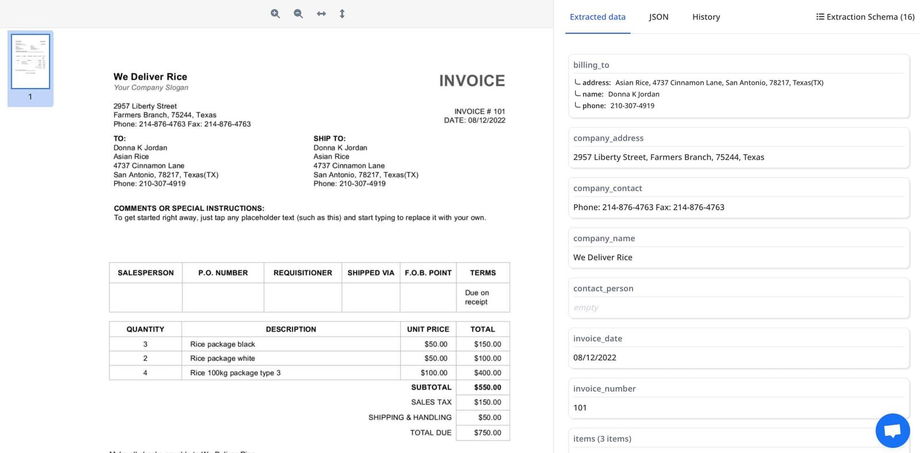🍲 Extract Data from Google Drive Documents with Make
🧰 Use Case
Automatically parse documents (PDFs, Word docs, images, email files, etc.) placed in a Google Drive folder. Extract structured data using Airparser without manual uploading — fully automated via Make.
🔍 Requirements
| Component | What you need |
|---|---|
| Airparser account | Active account; extraction schema(s) set up (fields you want parsed) |
| Make account | Access to create a scenario / workflow |
| Google Drive | Folder to monitor; ability to connect to Google Drive via Make |
| (If using a Gmail / Googlemail account) | A custom OAuth client via Google Cloud Platform to allow restricted scopes — see Google Drive integration documentation |
⚙️ What’s Being Built
-
Trigger: New file appears in a specific Google Drive folder
-
Intermediate Step: Download file content
-
Action: Send file to Airparser for parsing
-
Optional next steps: Save results, export, or route the data wherever needed
🪜 Recipe Steps
1. Create a new scenario in Make
-
-
Select Google Drive as the trigger module → “Watch Files in a Folder”.
-
Select Airparser as the action module → “Upload a Document for Parsing”.
-
2. Connect Google Drive
-
-
Add a new connection for Google Drive.
-
Important for Gmail/Googlemail users: you must set up a custom OAuth client in the Google Cloud Platform and supply client credentials. This is required to use Google Drive with restricted scopes via personal accounts. Learn more here.
-
3. Select the folder to monitor
-
-
Choose the Drive (e.g. My Drive) and select a folder (e.g.
Airparser inbox) where you will drop your documents. -
Optionally, set filters such as “file types to watch” and limit number of files per run.
-
4. Download the file
-
-
Add a Google Drive → Download a File action.
-
This ensures Make pulls in the actual document content so it can be handed off to Airparser.
-
5. Configure Airparser upload
-
-
Connect your Airparser account in Make.
-
Select the Airparser inbox where parsed documents should be sent (e.g. “Invoices”).
-
Map the file content obtained from Google Drive into the Airparser module.
-
Optionally include metadata via a custom payload (e.g. project name, client ID, tags).
-
6. Test the workflow
-
-
In Make, click Run once to run a test execution.
-
Upload a sample document into your monitored Google Drive folder.
-
Observe Make detecting the file, downloading it, and submitting it to Airparser.
-
7. Check parsing result
-
-
Log into Airparser → open the inbox.
-
Wait for parsing status to move from Parsing → Parsed.
-
Verify extracted fields match what you defined in your schema.
-
8. (Optional) Post-processing
-
-
Export the parsed data (JSON, CSV, Excel).
-
Send it onward to Google Sheets, other apps via Make, a webhook, or your internal tools.
-
Add notifications or automated routing (e.g. send to Slack, your accounting system, etc.).
-
📋 Expected Result
Once successfully set up:
-
Any document you drop into your Google Drive folder is automatically picked up.
-
Airparser will extract structured data fields (invoice number, date, line items, total, sender, etc.) based on your schema.
-
Parsed data is available in the format you choose (JSON, Excel, CSV, etc.) or forwarded to downstream tools.
-
No manual uploading or copy-pasting required.
⚠️ Notes & Troubleshooting
-
Gmail/Googlemail accounts require extra setup: without a custom OAuth client and client credentials, you may see errors or be unable to connect Google Drive in Make.
-
Make triggers may have limits on polling frequency or file limits per run — plan accordingly.
-
For certain file types (e.g. scanned images or email attachments), ensure your Airparser schema supports those formats (OCR, email parsing, etc.).
-
Test with varied sample documents to ensure schema covers edge cases (multiple line items, different layouts, optional fields, etc.).
✅ Tips for Best Practice
-
Use consistent naming for your Google Drive folder to avoid confusion.
-
Include identifying metadata in the custom payload (if multiple workflows share the same inbox).
-
Monitor error logs in Make and Airparser to catch parsing failures.
-
Schedule scenario execution frequency in Make as needed (every few minutes, hourly, etc.).










